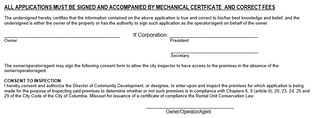Court case highlights problems with CoMo rental inspection law, Part 1
Civil rights waiver prompts concern
COLUMBIA, 4/27/2016 (Special Report) -- "You have the right NOT to sign the waiver."
That was Columbia Municipal Court Judge Robert Aulgur last month, in a challenge to the way city officials enforce the Rental Unit Conservation Law (RUCL), Section 22-180 of Columbia's city ordinances.
The RUCL is one of the most unusual city ordinances in the United States, for the broad rights it grants City Hall -- and can take away from tenants, property owners, and property managers.
Other mid-Missouri cities, including Jefferson City, have begged off enacting similar measures, for the legal minefields they create.
In last month's court case, longtime Columbia residential rental owner Amir Ziv (left) challenged the city's increasingly heavy-handed enforcement of the RUCL, including a requirement property managers waive a host of civil rights to permit inspections.
Not alone in his concerns, Ziv describes significant fee hikes; a condescending official attitude he calls "a real put-down to the professionals in our business"; and a cavalier approach to rental unit inspections that invariably rattles renters.
Inspectors have been known to arrive early, late, or not at all, charging property managers for "missed appointments" they may be responsible for messing up.
The Columbia Heart Beat has followed developments on rental compliance and related issues for years.The first line a property manager must sign to comply with the law. But the second line should be carefully considered before signing, if signed at all.
Ziv didn't sign either line, but turned in the application with fees and required furnace inspection. Aulgur penalized him for not signing the first line, but supported his not signing the second.
Consent Change
About two years ago, City Hall changed the application landlords and property managers must make to comply with RUCL.
They added a clause called CONSENT TO INSPECTION (image; click for larger) that waives the 4th Amendment Constitutional rights of property manager, property owner, and renters.
The 4th Amendment -- and Sec. 22-189 of Columbia's city ordinances -- guarantee that government-driven inspections of home/rental units must issue from Court-ordered warrants.
Every property manager who signs the Consent to Inspection signs away not only his/her civil and privacy rights, but those of renters or property owners for whom the property manager acts as fiduciary.
Why the change?For years, the consent to inspect was incorporated in a single notarized paragraph on the RUCL application. It was rarely noticed.
But controversy over a related law -- the Occupancy Disclosure Ordinance (ODO) -- prompted a re-examination of both laws.
The Columbia City Council repealed Un-Constitutional parts of the ODO.
And as a work-around to Un-Constitutional provisions in the RUCL, city staff created the Consent to Inspection, a civil and privacy rights waiver that omits important legal information.
It does not explain the rights an applicant is signing away. And in virtually every case, it is signed without the knowledge or consent of the people it most affects -- renters -- creating potential liability.
As such, it is NOT an "informed consent", an idea at the heart of every consent program, in law, medicine, research, and so forth.
No challenge -- yet
No challenge has yet emerged from a renter or tenant's rights organization, but the increasing size and sophistication of Columbia's population makes that possibility more probable with every passing year.
The recent ConcernedStudent1950 protests and the unprecedented resignations at Mizzou they prompted highlight this idea.
This series will explore the rental compliance program, featuring personal experiences; Supreme Court cases; legal opinions; praiseworthy inspectors; and suggestions for reforms some property managers say are long-overdue.
Heart Beat editor Mike Martin has been a property manager for 26 years, in multiple cities nationwide including Columbia. He helped organize the Landlords Against Crime Summit, and "crime free housing awards".
Sidebar
Mobile Menu

 The Columbia Heart Beat
COLUMBIA, MISSOURI'S ALL-DIGITAL, ALTERNATIVE NEWS SOURCE
The Columbia Heart Beat
COLUMBIA, MISSOURI'S ALL-DIGITAL, ALTERNATIVE NEWS SOURCE

13
Fri, Feb
